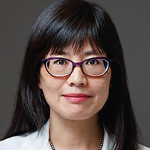Scenario: A patient with rheumatoid arthritis (RA) presents for a follow-up visit. After addressing her inflammatory arthritis symptoms, medications and laboratory results, she is asked if she has any other questions, and she begins describing her chronic low back pain, which has become worse despite physical therapy (PT). She requests stronger medications because her RA regimen has not helped her back. She is informed that her low back pain is unrelated to her RA, and because it has not improved with PT, referral to a physiatrist who specializes in spine conditions and may offer injections is discussed.
The patient expresses frustration that she does not have the time or resources to return and see yet another physician, particularly when she comes to see you several times a year. She identifies her rheumatologist as her arthritis provider. It is explained that this tertiary referral practice is focused on complex patients with inflammatory arthritis, and her interest is best served by a physiatry consultant.
The visit ends in dissatisfaction for both the patient and the rheumatologist.
Ethical Dilemmas
Perhaps a patient has not asked you about low back pain, but rather to address their hypertension, a laboratory abnormality not directly related to their rheumatic disease or another tangential medical issue. Richard L. Allman, MD, MS, a medical ethicist and member of the ACR Committee on Ethics and Conflicts of Interest describes several common ethical dilemmas that arise in these scenarios:
- What is our moral obligation to our patient when they ask us to address an issue we feel falls outside the usual parameters of our practice?
- What is my right as an individual provider and autonomous moral agent to determine the parameters of my practice?
- What are our ethical obligations to society, given that our skills are a finite resource?
Obligation to Our Patient: In this case, the patient is one with whom we have an established doctor-patient relationship. She is someone well known because she has been treated by our practice for many years. Her chronic kidney disease precludes treatment of her back pain with non-steroidal anti-inflammatory drugs. Would a physiatrist meeting her for the first time check her labs before prescribing an anti-inflammatory?
As rheumatologists, we usually see our patients more often than their primary care providers and know them best. Many patients identify us as their primary providers. I could address her concerns regarding having limited time and money by taking on some of her pain issues during the current visit and deferring the rest to her follow-up appointment. In these respects, I am as qualified to address her back pain as a back-pain specialist.
Scope of My Practice: Dr. Allman describes specialists as having a unique skill set to treat patients with complex diseases, and my finite time is spent meeting the needs of patients who fall within my specialized realm of interest and who are referred for that expertise. Such conditions as low back pain or hypertension can be better managed by other providers. By prioritizing the patient with complex disease, I am addressing the rheumatology workforce issues and still taking care of the needs of my patient by making an appropriate referral.
Obligation to Society: The potential pitfalls of the above claims must be acknowledged. Dr. Allman cautions that commitment to a specialized patient population could be a proxy for avoiding difficult or frustrating patients, such as those with nociplastic pain.
John Rawls’ idea of a well-ordered society and distributive justice argues that social and economic inequalities should be addressed in a manner to the greatest benefit of the least advantaged members of society.1 How is it determined who is most disadvantaged in terms of access to primary goods, among which is healthcare? Is it the patient with low back pain who cannot afford to see another provider or the patient on the wait list with lupus nephritis who has yet to meet a rheumatologist?
One community practice rheumatologist on the ACR Committee on Ethics & Conflicts of Interest, Norman B. Gaylis, MD, cautions that placing greater value on treating nephritis over back pain is unsound because individual cases differ.
Society helps defray the cost of training physicians and considers physicians a societal resource. We are trustees, rather than sole proprietors, of our skill sets and time.2 This was seen vividly during the COVID-19 pandemic when some of us were called to act beyond our usual roles and treat patients with COVID-19. In spring 2020, New York City had become the epicenter of the pandemic, and elective surgeries were canceled. I found myself far outside my comfort zone when assigned an appendicitis patient whose surgery was deemed elective.
The setting of our practice influences our choices. In a community with few rheumatologists, non-autoimmune conditions may, by necessity, be part of everyday practice. If one is part of a research institution with multiple specialty clinics, patients have access to more resources.
I work in a well-known orthopedic institution, and some of my patients prefer to have their mechanical joint problems managed by a knee or shoulder specialist. Other patients rely on my understanding of their musculoskeletal condition in the context of their overall health, about which I have become knowledgeable.
At the Hospital for Special Surgery, rheumatologists sometimes become the perioperative internists when patients undergo total joint arthroplasty. I may refer my patient for total knee replacement, do a preoperative medical evaluation, attend them in-house as the medical attending, including managing their RA medications perioperatively, and resume care as their rheumatologist postoperatively. My patients appreciate seeing me in the recovery room, and I enjoy the fluidity of my role in their care. Our provider-patient relationship is often strengthened through it.
After my children left home for college, I began to incorporate more scholarly activities into my work stream. Clinical practice was constrained, and I struggled to perform both responsibilities well. I now had a greater need to focus my practice on the area of expertise I was trying to achieve in as my second calling. For patients I knew well, I would try to accommodate their requests whenever possible. I would refer others to my orthopedic colleagues.
Our practices evolve with us in our professional journey. Although our ethical obligations to our patients, our future patients and society are ever present, the way we fulfill those obligations evolves with us. Whenever time constraints impede our individual ability to meet every need a patient may have, our obligation to the patient before us endures, and if we are not able to meet every need, our obligation remains to direct the management of those problems in the safest, most competent, expeditious and cost-effective way possible.
 Charis Meng, MD, is a rheumatologist at the Hospital for Special Surgery and Weill Cornell Medical College in New York City. She specializes in inflammatory arthritis, and her research interests include differentiating non-inflammatory from inflammatory pain in rheumatoid arthritis. She is a member of the ACR Committee on Ethics & Conflicts of Interest.
Charis Meng, MD, is a rheumatologist at the Hospital for Special Surgery and Weill Cornell Medical College in New York City. She specializes in inflammatory arthritis, and her research interests include differentiating non-inflammatory from inflammatory pain in rheumatoid arthritis. She is a member of the ACR Committee on Ethics & Conflicts of Interest.
Acknowledgment
The author wishes to acknowledge and thank Richard L. Allman, MD, for his important contribution to the writing of this article.
References
- Rawls J. A theory of justice. Harvard University Press. 1971. pp. 14–15.
- Pellegrino ED, Thomasma DC. The virtues in medical practice. Oxford University Press. 1993. pp. 43–44.
Editor’s note: If you have comments or questions about this case, or if you have a case that you’d like to see in Ethics Forum, email us at [email protected].



